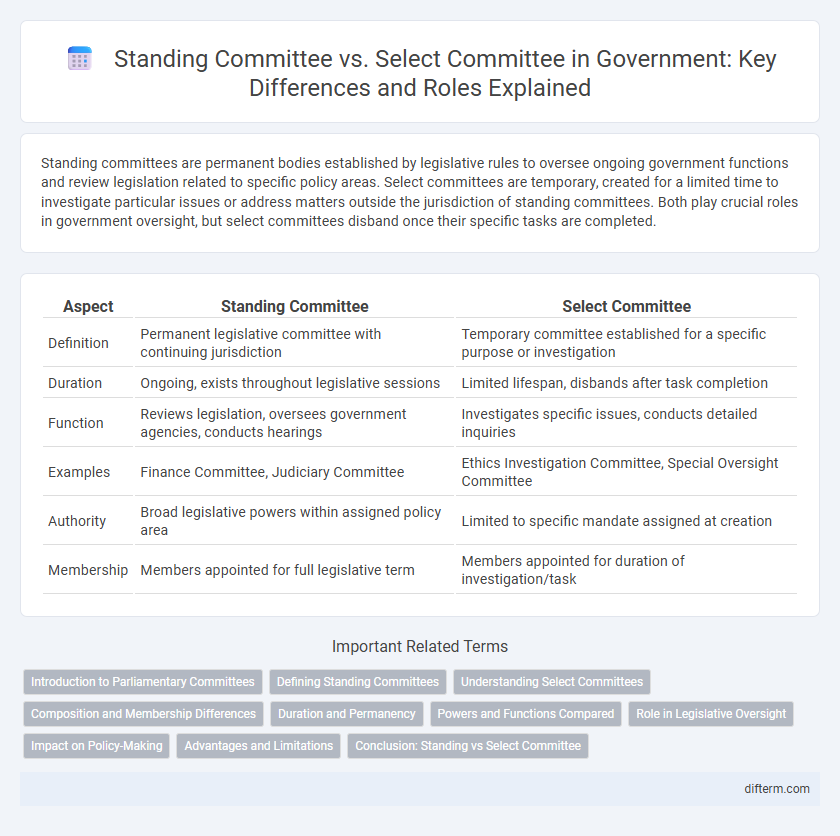Standing committees are permanent bodies established by legislative rules to oversee ongoing government functions and review legislation related to specific policy areas. Select committees are temporary, created for a limited time to investigate particular issues or address matters outside the jurisdiction of standing committees. Both play crucial roles in government oversight, but select committees disband once their specific tasks are completed.
Table of Comparison
| Aspect | Standing Committee | Select Committee |
|---|---|---|
| Definition | Permanent legislative committee with continuing jurisdiction | Temporary committee established for a specific purpose or investigation |
| Duration | Ongoing, exists throughout legislative sessions | Limited lifespan, disbands after task completion |
| Function | Reviews legislation, oversees government agencies, conducts hearings | Investigates specific issues, conducts detailed inquiries |
| Examples | Finance Committee, Judiciary Committee | Ethics Investigation Committee, Special Oversight Committee |
| Authority | Broad legislative powers within assigned policy area | Limited to specific mandate assigned at creation |
| Membership | Members appointed for full legislative term | Members appointed for duration of investigation/task |
Introduction to Parliamentary Committees
Standing committees are permanent parliamentary bodies established to oversee specific government functions, providing continuous scrutiny and policy evaluation. Select committees are temporary groups formed to address particular issues or investigations, disbanding after completing their mandate. Both types of committees enhance legislative efficiency by enabling detailed examination of government actions and proposed legislation.
Defining Standing Committees
Standing committees are permanent legislative panels established by parliamentary rules or statutes to oversee specific areas of government policy, such as finance, defense, or health. They possess ongoing jurisdiction and play a critical role in the legislative process by reviewing bills, conducting hearings, and supervising federal agencies. Standing committees differ from select committees, which are temporary entities created to address particular issues or investigations and disband after completing their tasks.
Understanding Select Committees
Select committees are temporary panels established to address specific issues or investigate particular matters within the government, providing detailed examination beyond the scope of standing committees. They focus on specialized topics, conduct inquiries, and often produce reports with recommendations for legislative or policy actions. Unlike standing committees, which are permanent and handle broad areas, select committees offer targeted, flexible responses to emerging concerns in governance.
Composition and Membership Differences
Standing committees consist of permanent members appointed for the entire legislative session, reflecting proportional party representation and stable expertise. Select committees are temporary, formed to address specific issues, with membership tailored to the task at hand, often including specialists or lawmakers from various committees. The composition of standing committees ensures continuity and institutional knowledge, while select committees prioritize flexibility and focused investigation.
Duration and Permanency
Standing committees are permanent bodies established by the legislative authority to oversee ongoing government functions and legislation, functioning continuously across sessions. Select committees are temporary, formed for specific purposes or investigations, and dissolved upon completion of their assigned tasks. The key distinction lies in the duration: standing committees maintain continuous operation to provide consistent oversight, whereas select committees have limited terms tied to their specialized missions.
Powers and Functions Compared
Standing committees have permanent status with broad legislative powers, including reviewing bills, overseeing government agencies, and conducting ongoing investigations. Select committees are temporary, established for specific tasks or inquiries, with limited duration and focused mandates, often lacking the same legislative authority as standing committees. The powers of standing committees encompass continuous oversight and amendments, whereas select committees primarily gather information and produce reports for further legislative action.
Role in Legislative Oversight
Standing committees provide continuous legislative oversight by monitoring government agencies, programs, and budget implementation within specific policy areas, ensuring accountability and transparency. Select committees are temporary bodies established to investigate particular issues or events, delivering focused reports and recommendations that address specific concerns or emergencies. Both types play critical roles in scrutinizing executive actions, but standing committees maintain ongoing oversight while select committees address specialized or time-sensitive matters.
Impact on Policy-Making
Standing committees provide continuous oversight and influence over legislative areas, ensuring consistent policy development and refinement through regular review and amendment processes. Select committees, formed for specific investigations or issues, offer targeted insights that can prompt urgent policy responses or reforms by addressing emerging or specialized matters. The ongoing scrutiny by standing committees promotes stability and coherence in policy-making, while select committees inject flexibility and responsiveness to evolving government challenges.
Advantages and Limitations
Standing committees provide continuous oversight and expertise on specific government functions, enabling consistent policy development and legislative review; however, their broad scope may limit focus on emerging issues. Select committees address specialized or temporary concerns with targeted investigations, allowing for in-depth analysis and timely recommendations, but their temporary nature can restrict long-term impact and institutional knowledge. Balancing standing and select committees enhances legislative efficiency by combining sustained scrutiny with flexible, issue-specific inquiry.
Conclusion: Standing vs Select Committee
Standing committees are permanent, with ongoing jurisdiction over specific policy areas and playing a crucial role in legislative review and oversight. Select committees are temporary, established to address specific issues or investigations not covered by standing committees. The choice between standing and select committees depends on the need for continuous oversight versus targeted, short-term inquiry within government operations.
standing committee vs select committee Infographic

 difterm.com
difterm.com